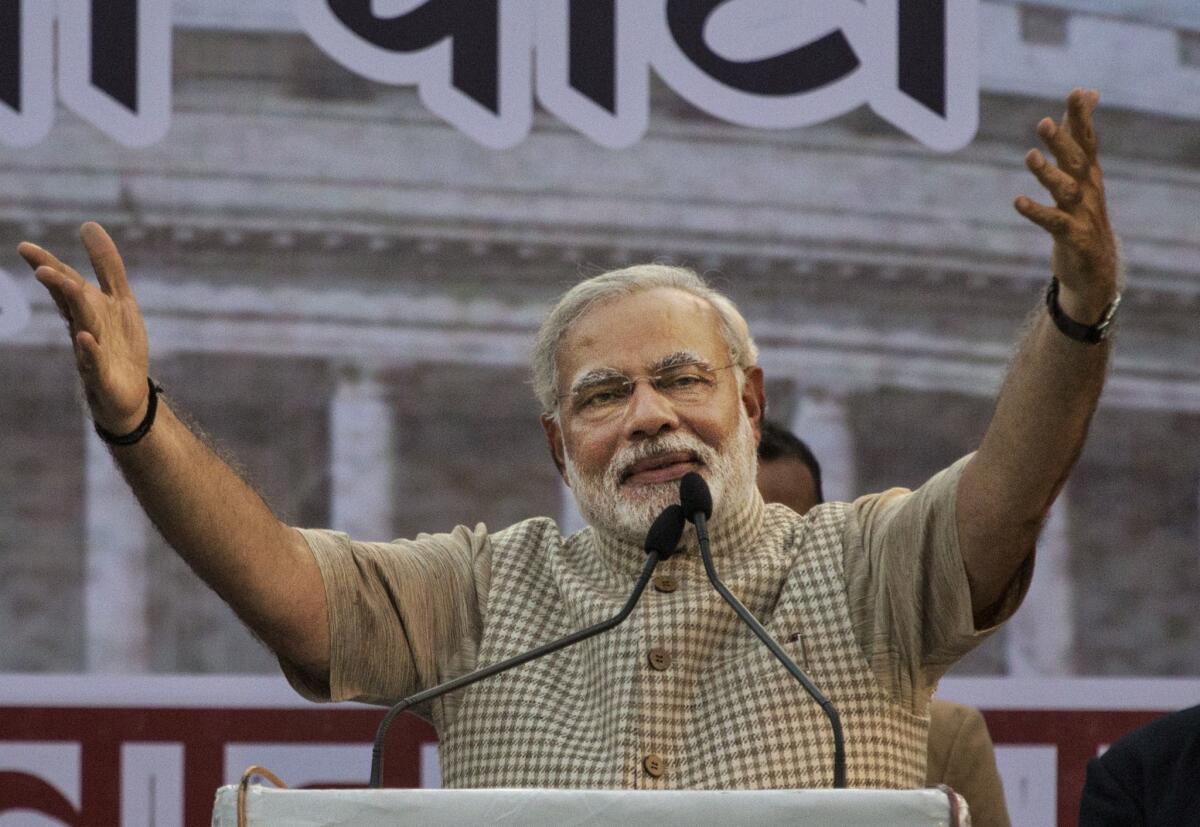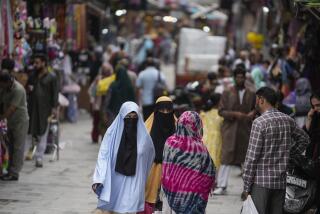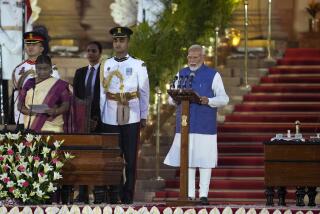India’s Modi defends Kashmir policy amid clash with Pakistan

- Share via
NEW DELHI — Indian Prime Minister Narendra Modi on Thursday used an Independence Day speech to defend his decision to strip Kashmir of its special status as about 7 million residents of the disputed region endured an unprecedented security lockdown and communications blackout for an 11th day.
Pakistan’s security forces, meanwhile, said “unprovoked firing” by India along the militarized Line of Control in the region killed three Pakistani soldiers and two civilians in separate incidents. Pakistan said it returned fire, killing five Indian soldiers. The Indian army said there were no Indian casualties.
They were the first reported clashes between the nuclear-armed rivals since New Delhi changed the status of Kashmir, escalating regional tensions. The two countries have fought two wars over the territory.
Modi said Kashmir’s previous status — some political autonomy and a ban on outsiders buying land and taking public sector jobs — had fueled a movement for separatism in the Muslim-majority Himalayan region that is claimed by both India and Pakistan.
He also said it was unjust for Kashmiri women because the law said they lost their inheritance rights if marrying a person from outside the region.
“The old arrangement in Jammu, Kashmir and Ladakh encouraged corruption, nepotism but there was injustice when it came to rights of women, children, Dalits, tribal communities,” Modi said, speaking from New Delhi’s Mughal-era Red Fort to mark 72 years of India’s independence from British rule.
Modi’s Hindu-led nationalist government imposed a lockdown in the Indian-administered portion of Kashmir on Aug. 4. That came just before a presidential order was announced to subsume the region into India’s federal government by revoking Article 370 of the constitution and downgrading the state of Jammu and Kashmir into two federal territories.
A new law allows anyone to buy land there, which some Kashmiris fear could change the region’s culture and demographics. Critics have likened it to Israeli settlements in Palestinian territories.
Indian Foreign Ministry officials have said Kashmir is returning to normal, but news organizations in the region describe severe constraints, including the suspension of internet, cellphone and landline services and steel and barbed-wire street blockades.
On Monday, the streets of Srinagar, Kashmir’s summer capital, were eerily quiet when they should have been bustling with people going to mosques to pray and to stores to shop for the holiday of Eid al-Adha. With an ongoing ban on public assembly, security forces allowed the faithful to enter mosques alone or in pairs only. Several main mosques were closed.
On the first Independence Day since the revocation of Kashmir’s special status, security restrictions in the city were even more stringent. More than a dozen Hindu activists were detained as they tried to march to central Srinagar to celebrate, according to police who spoke on condition of anonymity because they weren’t authorized to talk to reporters.
It was unclear how long the lockdown would last.
India’s top diplomat, Foreign Secretary Vijay Gokhale, said Monday the restrictions on daily life in Kashmir were “primarily precautionary in nature” and would be lifted gradually. Some have already been lifted in the Hindu-majority area of Jammu, where celebrations broke out after India’s Parliament signed off on the changes on Aug. 6, and in Ladakh, a rugged and pristine area with cultural ties to Tibet that Parliament divided off from Jammu and Kashmir and turned into a federal territory. Residents there have been demanding such a change for years.
More to Read
Sign up for Essential California
The most important California stories and recommendations in your inbox every morning.
You may occasionally receive promotional content from the Los Angeles Times.










